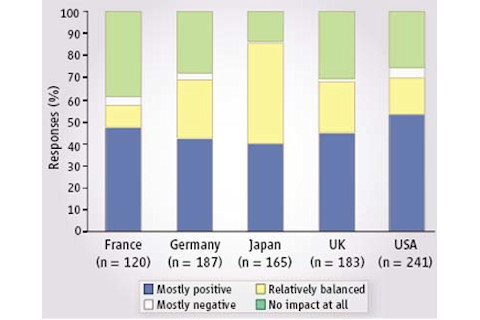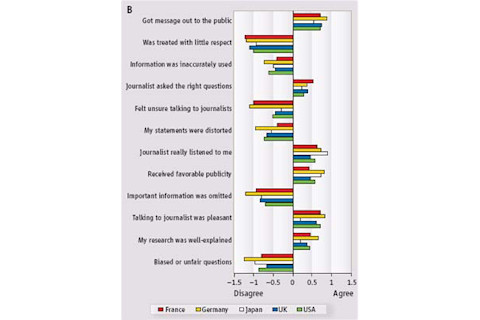
It seems that every scientist has an anecdote about being misquoted, misrepresented or otherwise misled by that most seemingly dangerous of foes - the journalist. And yet, a new survey published in Science suggests that beyond the horror stories, conflict between the two professions is much less volatile than you might imagine. To scientists, it seems that journalists are more likely to be back-slapping comrades than back-stabbing adversaries.

The interaction between science and the media is an area close to my heart. I am steeped in it in both my full-time job and my freelance work and I've been fortunate enough to have played most of the roles in the journalist-scientist drama. I've interviewed scientists for freelance pieces, I've been grilled numerous times myself over the phone and the radio, and I've been providing media comments for four years.
In the second half of this piece, I'll provide a few tips for the scientists among you who have to deal with the media. But first, let's take a look at the survey.
Testing positive
The alleged clash between boffins and journos is more steeped in stories than raw data. To remedy that, an international team of researchers led by Hans Peters sent a questionnaire to over 1,300 researchers about their flirtations with the press. The surveyed scientists hailed from the world's five largest producers of scientific knowledge - France, Germany, Japan, the UK and the US. All worked in one of two fields that are never far from the media's watchful eye - stem cell research and epidemiology (specifically of cancer, heart disease and stroke).
For a start, the survey revealed that an unexpectedly large number of scientists had dealings with the press, with 69% having had some contact over the past 3 years, and a particularly media-hungry 30% having had five or more run-ins.

The respondents were also upbeat about their encounters to a (perhaps) surprising degree. When asked to consider their contact with journalists throughout their career, 46% were mostly positive about their experiences, 24% felt that the good and bad sides were balanced, and a tiny 3% were mostly negative. Thinking back more recently, 57% were mostly pleased about their latest media appearance and again, a much smaller 6% were mostly dissatisfied.
The devil's in the detail here - you could easily rephrase the first finding to say that "54% of scientists were less than positive about their dealings with journalists". That would be accurate, but perhaps a tad unsympathetic. There clearly more work to be done to improve links between science and the media but the results certainly suggest that we're off to a good start, and some of the other answers support this idea.
My coverage vs. everyone else's coverage

When discussing their personal experiences, scientists agreed with positive statements about their media contacts and disagreed with negative ones. In all five countries and in both research fields, the respondents felt that on the whole, they were listened too, their research was well-explained and their message got out to the public, while instances of disrespect , inaccuracies and distortions of fact are not "typical".
But their opinions darkened slightly when they considered the portrayal of science in the media as a whole. When thinking about scientific topics in general, their feelings were much more mixed on the topics of accuracy of reporting, credibility of sources, hostility of tone or comprehensiveness of coverage. Why should that be? Are they looking at their own experiences through a rose-tinted mirror? There are a few possible reasons why scientists seem to be happier about coverage of their own research relative to science in general.
The team only sent the questionnaire to published scientists, as identified through a PubMed search. However, a lot of the worst "science" in the media comes from unpublished studies and reports. You know the kind - a kooky team of scientists unveils the formula for happiness or liking chocolate or some such, or a lobbying group called something grand like the Institute of Truth publishes their own report on the dangers of a chemical that, gasp, horror, is in your everyday products and please God, won't someone think of the children?
It is entirely possible to accurately and honestly report an individual piece of research, while harming the coverage of science as a whole, particularly if the work being described is of poor quality, or simply far less significant than its coverage implies. This is especially pertinent to epidemiology, a field where new studies typically emerge amidst an existing body of evidence, and where the consensus matters. But the big picture is almost never reported in a news piece, with the result that the researcher can be satisfied that their work has been well-represented, but a member of the general public can still walk away with a skewed view of the evidence. This problem is compounded by reporting bias - simply put, it's much more likely that a paper which says that something causes cancer will be reported than one which finds no significant effect.
Scientists could suffer from confirmation bias, where a dim view of science journalism is reinforced by the righteous indignation ignited by every piece of shoddy reporting, while a larger number of accurately written pieces provoke much forgettable reactions. Again, there is reporting bias at work - how many blogs do you know of that unpick the strands of slapdash journalism, and how many celebrate the instances where science is well served?
The research group only looked at two fields of science. I wonder whether the same positive personal results would turn up if they had interviewed, say, evolutionary biologists or geneticists? That being said, in their defence the epidemiologists were just as happy with the media as the stem cell researchers and their field seems prone to some truly spectacular misinterpretations.
All of these seem likely to me. But in many ways, they are immaterial. Despite their mixed feelings on the media, most scientists still chose to work with them. Why? A huge 93% of the respondents said that they wanted to achieve "a more positive public attitude toward research" and a similar proportion desired "a better-educated general public". A similar proportion (39%) were motivated by a personal boon to their reputation ("Look ma, I'm on television!") as were worried about the critical fallout from their peers (42%).
Others were worried about the media's "incompatibility with the scientific culture", the risk of being misquoted, and the "unpredictability of journalists". Well for readers who are keen to get the most out of your flirtations with the press, here's a quick guide from me to dealing with journalists, reducing the chances of being misquoted and wresting control of unpredictable situations.
Media work for dummies
First, some clarifications. Firstly, this isn't a treatise on the strengths and weaknesses of science journalism but an introduction on playing the game as it exists. Secondly, the advice mainly applies to interviews on news items, which tend to be short and fairly focused. Thirdly, it deals with a general picture of a "science journalist". Some will be pushy or incompetent, others will be Carl Zimmer. But beneath it all, the tactics for dealing with both good and bad journalist are fundamentally the same.
Understand your dancing partner. If you accept that improving the public understanding of science is a worthy goal and that science journalism is a route to doing that, (many people submit to neither, but chances are they don't read this blog...) then it's also worth accepting that there are certain things about journalism that you are very unlikely to change.
First and foremost, the majority of journalists are not seekers of the truth; they serve at the all-important altar of "The Story" and the ultimate goal of The Story is to keep the reader/listener/viewer entranced with it from opening word to final syllable. It's entertainment, and it certainly is a different "culture" from that of science, but it shouldn't be a barrier to finding common purpose. More on this later. As a minor point, journalists will always be busy, so the deadline will most often be "today". If you're interesting in cooperating with journalists to improve the public understanding of science, you're going to have to accept that occasionally, onerous demands will be placed on your time.
Understand the point of the game. Many people approach interviews with the sense of foreboding typically reserved for playing a game of chess with Death. Heaven forbid that the journalist should smell blood, sense fear or attack you with that most feared of weapons - the "unpredictable" trick question.
But all this is borne of a fundamental misunderstanding of your role and theirs. Their job is not to grill you with hard questions - it's to find The Story and get you to say something interesting. Your job, interestingly enough, is not to answer their questions to the letter, but to get your message across and to do so in an interesting way. Note the compatibility between these two goals.
The easiest way to mutually assured victory is to get your message across in a way that's interesting enough that you practically hand them The Story on a plate. Journalism is a game but it's not a zero-sum one. You and the journalist are not vicious gladiatorial opponents; you are engaging in a collaborative venture and treating it as such will help you get more out of it.
Understand your own goals. I said earlier that your job is to get your message across, rather than to answer the questions you're given and to do that, you need to decide beforehand what you want to say. Have about 3-5 key points at the ready, note them down and practice speaking them aloud. Sticking to your message is both the best offense and defence.
This advice is especially relevant for radio and TV interviews, which tend to be very short. You are in a race against time and question to say what you want to say. Even without any tricky or difficult questions, it's entirely plausible that you will wander of course. Don't let that happen. Tangents are your enemy and they turn up to the detriment of your message. If someone asks you a difficult or unexpected question, acknowledge it and then find a way to bring the conversation back to what you want to say. You see politicians do this all the time and the trick is to do it subtly enough so no one notices.
Remember, you and the journalist are fundamentally after the same thing - you want to give your audience something interesting. You can be evasive as long as your alternative answer is interesting enough to warrant it. And from a journalist's point of view, it's an absolute delight when an interviewee gives you a golden quote - something that perfectly encapsulates their research or opinion with creativity, eloquence and yes, sometimes even humour.
If you fear being misquoted, then start slipping these hidden gems in the middle of what you say and you can essentially control which part of your quote makes the cut. Don't believe me? A little game I play whenever I comment on a story for BBC Online is to see whether I can get a portion of my quote in the little pull-out box - check it out, there's a reasonable success rate.
Understand the rules of engagement. To do a good interview, you ought to sound like you're having a conversation with someone, rather than reading from a script or worse still, shouting down from an ivory tower. Lay language is paramount - imagine you're explaining your work to a friend at the pub, rather than to your colleagues.
Don't let yourself get pushed around. Never be afraid to repeat the same answer ad infinitum if the alternative is having words put into your mouth. If you're doing a pre-recorded interview, so much the better - they'll only cut a short clip of what you say so feel free to repeat yourself.
But do not be lulled into a false sense of security if the interview starts becoming more informal. There is no "record" much less a way of being "off" it; anything you say in an interview is fair game, so stick to your messages. Similarly, beware the leading question. If a question starts with "Would you say that...", then answering with a yes is like handing over a sealed contract that allows you to be quoted with what the interviewer said. You don't want that - you want them to quote your words.
And finally, if you get asked a very basic question, don't get offended. The obvious interpretation - that they've totally failed to do their homework, or possibly haven't heard of Google - is entirely plausible. But it's equally plausible that they want a quote, that they're trying to get you to explain your research in a pithy and interesting way. You, rather obviously, want the same thing.













